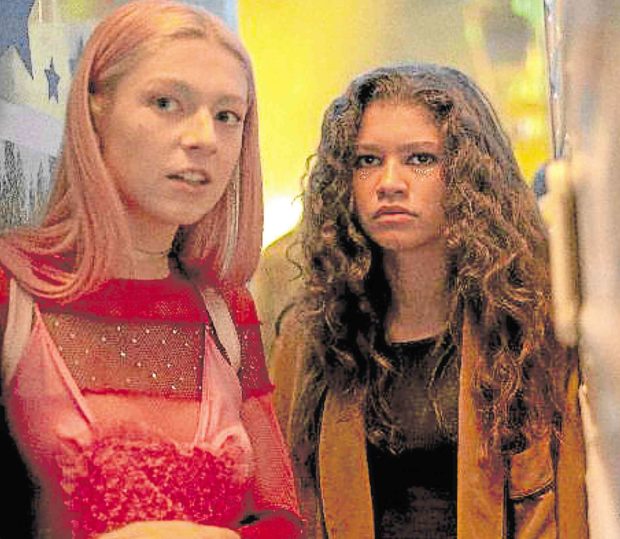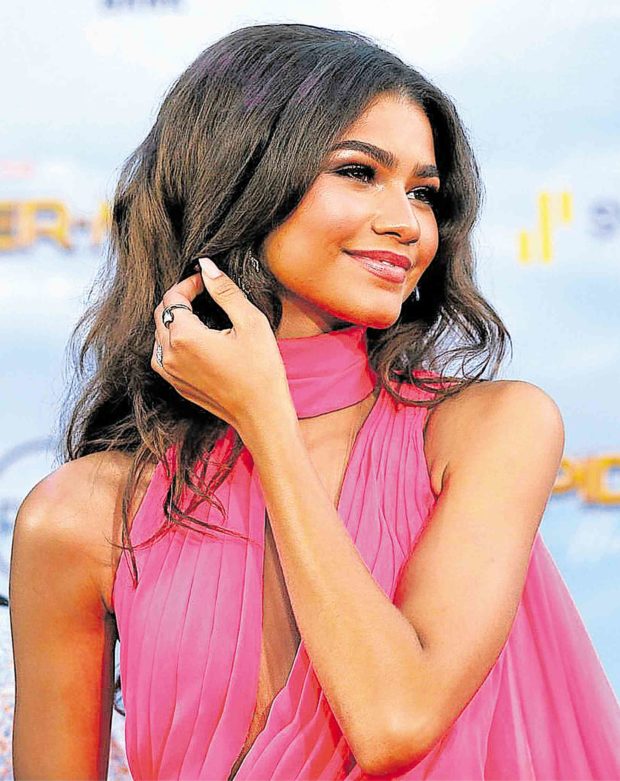Zendaya on hitting rock bottom in ‘Euphoria:’ We’re not defined by the worst mistakes we’ve made

Hunter Schafer (left) and Zendaya in “Euphoria” —PHOTO COURTESY OF HBO
It’s refreshing to conduct interviews where actors discussing their latest movies or TV series don’t seem to be merely putting their best game faces on.
Such was the case when we interviewed singer-actress Zendaya early this week to talk about the eight-episode sophomore season of HBO’s deeply provocative coming-of-age series “Euphoria,” for which her portrayal of lead character Rue Bennett, a 17-year-old recovering addict who must navigate the perils of drug abuse, sexuality, low self-esteem, teenage angst and adolescent love, has made her the youngest ever best actress winner in a drama series at the Emmys last year.
We’ve sat through seven of Season 2’s eight episodes so far. If the pilot season’s no-holds-barred depiction of sex and violence shook you to the core, here’s a fair warning: As they say, “You ain’t seen nothin’ yet!”
One role to another
It wouldn’t be a spoiler to say how much Rue’s breakup with her transgender girlfriend Jules Vaughn (Hunter Schafer) has torn her sagging spirits to pieces and thrust her into relapse—but we’re getting ahead of ourself here.
Zendaya has been hopscotching from one plum role (“Dune,” “The Greatest Showman”) to another (the “Spider-Man” films). But while she looked every bit the glamorous movie star that she has become during our chat with her and the whole cast of “Euphoria,” the actress laughed, yawned and stretched her arms in between questions. She was never cocky and was, in fact, kind and polite without being obsequious.
For the interview, the actress was paired with Hunter and fast-rising Filipino-American singer-songwriter Dominic Fike, who plays Elliot, a cocaine-snorting musician who becomes an unlikely love interest for both Rue and Jules.
Zendaya laughed out loud when we told her how her fine chemistry with Hunter and Dominic felt like a “darker” and less wholesome version of “Spider-Man’s” affable trio, made up of Zendaya, Tom Holland and Fil-Am actor Jacob Batalon. (“Spider-Man: No Way Home” opened in Philippine theaters yesterday, while Season 2 of “Euphoria” launches tomorrow.)
But if you’ve seen how the 25-year-old actress has been shockingly deglamorized by her depiction of Rue, you know that the comparison abruptly ends there. In fact, Zendaya told us how difficult it’s been for her to execute the self-destructive actions she didn’t want her troubled character to do.
Painful battle
“This is a very difficult show to act in,” she said. “And it can be quite painful because your body doesn’t really know that any of it is not real, even if your mind does. And honestly, if you really care about the characters, which I know we all do, you just want them to make the right decision and be OK.
“For me, that’s a painful kind of battle that you wage inside you, where you must do something you wish they wouldn’t do. It’s something you’d never say in real life, which is difficult when it’s with people you deeply care about! You want to tell them, ‘I’m so sorry for doing this … I don’t mean any of it! This is just a character, so please forgive me after this.’
“But what made it special was the fact that we were in a safe environment, inhabited by people from the top (showrunner-director Sam Levinson) and down to the crew. I felt very protected to be able to do my best work.
“I was in good hands, so I knew that I could go to the places I needed to go because I had the support I needed to pull it off. They had my back, and that’s the only way you can operate with something as intense as this.”
“Euphoria” Season 2 premieres tomorrow at 11 p.m. on HBO and HBO Go, where you can also stream episodes of Season 1 you either missed or wish to revisit.

Zendaya—REUTERS
Our Q&A with Zendaya:
What do you think have we lost in an era when people want all the characters they see in a show to be a reflection of their values, rather than a mirror of the real world that exists around them?
The concept of empathy, as well as the idea of a greater understanding of human nature, has always been important for me and the show itself. In Rue’s case, she does things that are painful, not only to herself, but also to other people, and we see that fall out over and over again.
Rue hits rock bottom this season. So, it’s my hope that the people watching can continue seeing her as a person worthy of their love and time. Despite everything, I hope they still see the good in her that’s worthy of redemption, even if she can’t see it herself.
If people can go through something like that with her, then watch her take the necessary steps on the road to sobriety, then maybe they can extend that empathy to others struggling with the same issues. That’s often out of their control.
I care about Rue deeply, and I also care about the people who care about her, because many of them share her story of addiction, sobriety and emotional disorders. It’s important that we continue to have that love for her. That may be a long-winded way of saying how important it is to have characters that are flawed, then remember that we are not defined by the worst mistakes we’ve ever made.
One of my favorite lines this season comes from the dinner episode, when Ali (Rue’s Narcotics Anonymous sponsor, played by Colman Domingo) talks about redemption. He says, “If you think that you’re already a bad person, you’ll just keep doing bad things because what’s the point…?” You just have a bunch of people around you who doesn’t give a f**k about redemption!
Rue needs to find the good in herself to remember that she is still worthy of love, happiness and other beautiful things. Just because she had made mistakes doesn’t mean she doesn’t deserve a good life. And that’s easier for me to say about her than for her to say about herself. But that’s my hope for her.
The first season of “Euphoria” was as groundbreaking as it was controversial (for its full-frontal nudity and violence)—we’ve never seen anything like it. How has the show affected your red-hot career, because I have a feeling your fans didn’t really expect to see you in a show as explicit as this one?
I just felt like I had to do this show. I felt very connected and emotionally invested in Rue and the other characters. When I met Sam (Levinson), I was immediately drawn to the story that he was telling and how honest it was—because I think Rue is just a version of Sam and his experience with addiction. And I thought it was such a beautiful story!
So, it wasn’t a matter of “Is this the right thing to do?” or “What will people think of me if I do this?” All those preconceived notions about what I was supposed to do quickly went out the window because I was focused on what felt like the right decision and career move. If I was going to do something as beautiful and daring as this, there was no better home to do it than with HBO.
I’m very grateful for the people who have grown with me and followed my career—and that’s been really special. But then, there’s also a lot of people who connected to “Euphoria” and Rue regardless of age.
Some viewers see Rue as a reflection of themselves, whether that’s because of their mental health struggle or sobriety journey. I became the catalyst that connected people to this story. I got to be the storyteller in the middle, and I continue to feel very grateful for that responsibility.
I’ve been able to meet people from different walks of life and in different age groups because the series has managed to put words to an experience that they couldn’t quite describe or readily articulate. That’s the beautiful thing about “Euphoria.”
You often talk about finding hope in the young people. Do you think hope is something that can be consistent with the dark themes and gritty issues being tackled in “Euphoria”? With all its doom and gloom, is that important for the show to pursue?
Other than redemption, hope is one of the current season’s biggest themes. Halfway through Season 2, when Rue really hits rock bottom and it becomes extremely painful for me to do, I remember thinking, “We can’t stay here! We just cannot leave Rue here.”
I’ve always felt that Rue would eventually be OK … because she’s a version of Sam, who was able to turn all his pain into this beautiful television show many years later. But knowing that wasn’t enough—I wanted to see that actually happen to Rue onscreen … to give her a sense of hope!
It’s important to know that there’s something beautiful at the end of that pain and suffering. We all deserve the good things in life, regardless of our mistakes. It’s a long journey, but hopefully, people will feel that promise of hope as soon as we get through the tough parts. After all, everybody deserves a happy ending.